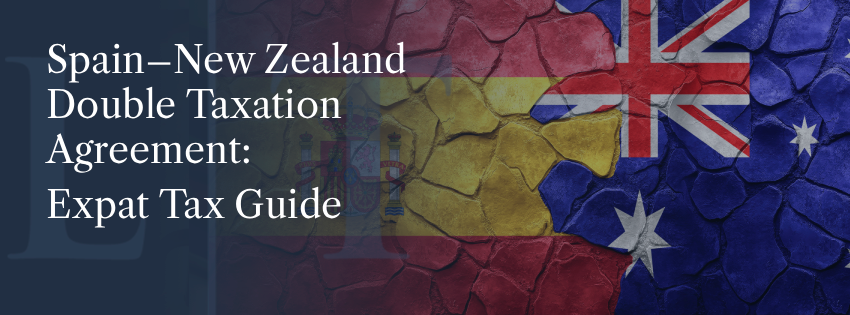The Expat’s Guide to the Spain–New Zealand Double Taxation Agreement
For expatriates and investors moving between Spain and New Zealand, understanding how income is taxed can be challenging. Without proper planning, individuals and businesses risk being taxed in both countries on the same income.
To avoid this, Spain and New Zealand signed a Double Taxation Agreement (DTA), in force since 2006, which establishes clear rules for allocating taxing rights and preventing double taxation.
At Lextax, we specialize in guiding international professionals, retirees, and companies through Spain’s complex tax landscape. This guide explains the key features of the Spain–New Zealand DTA and how expats can benefit from it.
1. Why the Spain–New Zealand DTA Matters
The DTA ensures:
- No double taxation: Income is taxed either in Spain or New Zealand, not both.
- Reduced withholding taxes: On dividends, interest, and royalties.
- Clarity on residency: Tie-breaker rules decide tax residency in cases of conflict.
- Certainty for businesses: Clear definitions of permanent establishments.
- Fair treatment: Non-discrimination provisions for nationals and residents.
For expats, this agreement provides a predictable framework for tax obligations.
2. Tax Residency Rules
Both countries have their own residency criteria:
- Spain: You are tax resident if you spend 183+ days per year, have your main economic interests in Spain, or your spouse/children live there (Article 9, Ley del IRPF).
- New Zealand: Residency is based on the 183-day rule and/or having a permanent place of abode in New Zealand.
👉 If both Spain and New Zealand claim you as a tax resident, the treaty tie-breaker applies, considering:
1. Permanent home.
2. Center of vital interests.
3. Habitual abode.
4. Nationality.
3. Key Provisions of the Treaty
Dividends
- Reduced withholding tax: Maximum 15%.
- If the recipient company owns at least 25% of the payer, rate reduced to 5%.
Interest
- Withholding capped at 10%.
Royalties
- Withholding capped at 5% for use of copyright, patents, or trademarks.
Business Profits
- Taxable only in the country of residence unless the business has a permanent establishment in the other country.
Employment Income
- Taxable where work is performed.
- Short-term assignments (less than 183 days, no employer presence in the host country) are exempt.
Pensions
- Private pensions: Generally taxable in the country of residence.
- Government pensions: Taxed only in the paying country.
4. Practical Examples for Expats
- Example 1: A New Zealander living in Spain but receiving NZ pension → Taxable in Spain under the DTA (unless government pension).
- Example 2: A Spanish company paying dividends to a New Zealand shareholder → Withholding tax limited to 5–15%, not the domestic 19%.
- Example 3: A Kiwi consultant working in Spain for under 183 days, paid by a NZ employer → Exempt from Spanish tax under Article 15.
5. Common Pitfalls for Expats
- Assuming the 183-day rule is the only test → Spain also applies economic and family ties.
- Not applying for a Certificate of Tax Residency → Required to benefit from DTA rates.
- Forgetting Spanish Wealth Tax → Not covered by the treaty, applies to worldwide assets for residents.
- Inheritance & Gift Tax → Also not covered by the treaty, requiring specific planning.
6. How Lextax Helps Expats and Investors
At Lextax, we provide:
- Residency planning: Determining whether you are tax resident in Spain or New Zealand.
- Treaty application: Ensuring you benefit from reduced withholding taxes.
- Cross-border compliance: Filing in both countries correctly.
- Investment structuring: Optimizing real estate, pensions, and corporate holdings.
- Wealth & estate planning: Covering taxes not included in the DTA (wealth and inheritance).
FAQs: Spain–New Zealand DTA
Do I need to pay tax in both Spain and New Zealand?
No, the DTA prevents double taxation. If taxed in both, you may claim credits.
Are pensions taxed in Spain or New Zealand?
Private pensions are taxed where you live. Government pensions are taxed in the paying country.
Do I need a tax residency certificate to use the treaty?
Yes, required by both countries’ tax authorities.
Does the DTA cover Wealth Tax or Inheritance Tax?
No. These are separate Spanish taxes requiring additional planning.
Can Lextax represent me if I live in New Zealand?
Yes. We assist expats remotely with full compliance in Spain.
Conclusion
For expatriates and investors between Spain and New Zealand, the DTA is a valuable tool to reduce tax exposure and avoid disputes. Still, Spain’s domestic rules — including wealth and inheritance taxes — require careful planning.
At Lextax, we act as your translator of complexity, ensuring your move or investment between Spain and New Zealand is managed with clarity and efficiency.
👉 Planning to move to Spain from New Zealand, or investing across borders?


